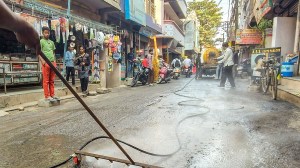Towering prejudice
In a move that has reverberated across Europe,57 per cent of Swiss voters decided through a referendum to block the construction...
In a move that has reverberated across Europe,57 per cent of Swiss voters decided through a referendum to block the construction of a minaret in Langenthal,just north of the countrys capital,Berne. A two-year campaign by the nationalist Swiss Peoples Party insisted that minarets thrusting into the skyline would be a concrete sign that Switzerland was systematically being turned into an Islamic nation. Switzerland is not alone in this paranoia; after decades of immigration consciously encouraged by post-war Europe,the entire continent is contending with questions of assimilation and identity,and the tension between metropole and margin. They have surfaced around mosques in Germany,headscarves in France. Given how ferociously conformist the Swiss are you cant flush a toilet in an apartment block after 10 at night,people routinely tell on their neighbours for minor rule-breaking this minaret proposal was bound to shake up the citizenry.
Then again,Switzerland is a place of oddly made institutions. It has long been a Swiss conceit that their democracy is the most bottom-up effective; built around referenda,it means the average citizen casts her vote on as many as 20 different issues a year,from big national questions to matters which intimately affect a community. These work in peculiar ways,often holding up crucial change: for instance,women were enfranchised for federal election only as late as 1971,and one Swiss canton denied women the right to vote locally until 1990.
So the big takeaway from the ban is the danger of involving the people in every decision especially polarising ones that hinge on matters of tolerance without allowing a mediatory role to the institutions of liberal democracy. American states with a strong record of direct legislation have shown how the ballot can be deeply illiberal; if youre homosexual in Colorado or an immigrant in California,you can find your rights struck down at various points by a bigoted electorate,no matter how well-intentioned your political representatives are. Switzerlands ban must re-ignite the debate on illiberal vs liberal democracy.
- 01
- 02
- 03
- 04
- 05































